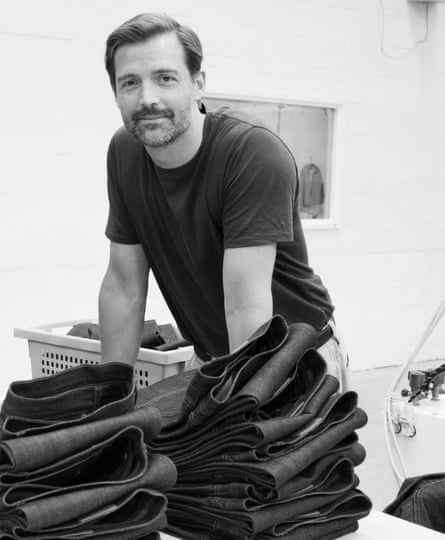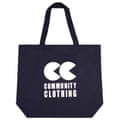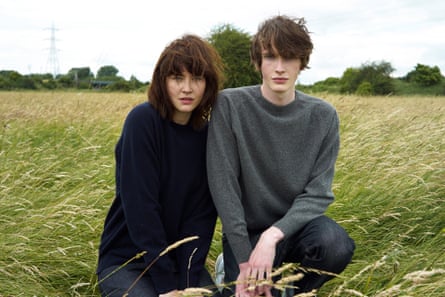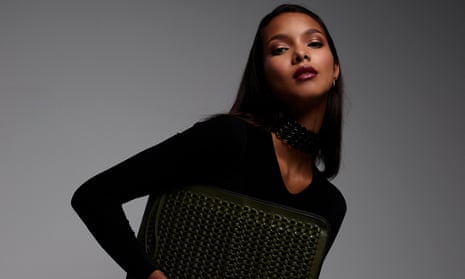Eco-Age founder Livia Firth and entrepreneur Miroslava Duma were on hand this week in London to celebrate Bottletop – a fashion brand that has built a business out of making luxury handbags from waste drinks cans – now opening its first flagship store on London’s Regent Street. Bottletop is unusual, not because it makes bags out of other people’s rubbish, or because the geek-meets-chic store will have the first zero-waste interior to be 3D printed from recycled plastic complete with a resident robot making customised bag charms and key rings while you wait – although that does clock up several USPs. No, Bottletop is unusual in that it does not put its profit margins first.
The brand was started in 2002 by friends Cameron Saul, 35, and Oliver Wayman, 33, as a charitable collaboration with Mulberry (the luxury fashion house that Saul’s father, Roger, founded). The first bag was made in Kenya from ring pulls and leather off-cuts, and was sold to create employment and improve lives in under-developed communities. Their atelier is now in Salvador, Brazil, where ring pulls are hand-crocheted on to certified zero-Amazon-deforestation leather, and they continue to produce an art-on-canvas collection in Kenya. It feeds 20% of profits (around £1m so far) back into the Bottletop Foundation to fund health and education projects in Salvador, Rio de Janeiro, Nairobi and Ethiopia.

What is interesting is that the social enterprise element of Bottletop’s business model is what is giving it the edge over its rivals. Not being driven by profit is, in other words, good for business. A retail space on the Crown Estate’s prime Regent Street location has powerful and established brands competing for it. But after hosting a pop-up shop in the summer, Bottletop proved they could bring a more positive message to the retail landscape than its competitors: an immersive experience where you can learn about cutting-edge sustainable technology. “Sustainability is starting to matter in the broader world,” says Saul. “The product speaks for itself and performs well. People are looking for brands with those values.”
Bottletop are pioneers in this field but their contribution of 20% towards their foundation seems small beer compared with an audacious new brand launching in January, which calls itself Ninety Percent. The clothes are what creative director Ben Matthews calls “detail driven staples”. They unveiled the collection to the fashion press last week – revealing timeless pieces you might need and will actually wear. The prices are accessible but reflective of the production costs and the quality and providence of the fabrics, which include organic cotton, and some sustainable fibres: £40 for the perfect white T-shirt; £80 for a sweatshirt.
For each Ninety Percent garment you buy, you are given a link in the garment’s label, which enables you to go online and choose one of four charities to donate your share of 90% of the brand’s profits to. The actual pieces are under wraps for now – but 90% of the profits (hence the name) go to charity. But this is not a charity. It is a commercially run business based on a positive, innovative model that shares 90% of distributed profits and only retains 10% for shareholders. It is the traditional business model turned on its head.
In a crowded market Ninety Percent will be more than just a fashion brand, says Matthews, who was previously buying manager at Net-a-Porter. They want to create a social movement aimed at women who want good quality, well-designed clothes but also want to know their clothes have been made with careful regard for their social and environmental impact.
The brand’s founders own Echotex, a pioneering ethical trade and LEED Platinum certified manufacturing unit in Bangladesh. They are leading the way for a new generation of manufacturers committed to sustainable practices, and ensuring that pay and conditions are at the core of what they do. Ninety Percent will sell direct to the consumer via its own website and a smart social media campaign, cutting out layers of costings that retailers’ overheads add. It’s a way of keeping prices lean without having to exploit the supply chain in the process.
When it launches, the website will tell the story behind the label, profiling employees and factory workers, allowing the customer to see who makes their clothes, as well as giving them an element of control over deciding which charities will benefit from their purchase. “I didn’t want this to be some niche brand,” says Matthews. “We want to talk to our customers.” Their hashtag is #DRESSBETTER.

It is a similar model to one being successfully utilised by the British startup Community Clothing, a collection of great-quality British basics for men and women designed by Patrick Grant and made in Britain. It is not just Bangladesh that has a problem with its treatment of garment workers. “The British clothing industry faces serious challenges. For several months of the year even the best British factories are nowhere near full. This can lead to seasonal hiring and firing, zero hours contracts, or worse – factory closures,” says Grant.

Grant is an established designer in his own right, a previous recipient of the British Fashion Council’s Menswear Designer of the Year award for his work on the brand E.Tautz. He is the creative director of the Savile Row tailor Norton & Sons, and you may also know him from BBC Two’s The Great British Sewing Bee. Community Clothing is his concept, and is a social enterprise dedicated to making clothes, creating jobs and restoring pride in the UK textile industry.
Since Grant launched the brand in 2016, Community Clothing has generated nearly 8,000 hours of skilled labour in seven manufacturers across England and Scotland as well as six textile suppliers. It is a business model that puts the supply chain first, with design-based solutions creating a pared-back collection of classic pieces made in great-quality fabrics. The Community Clothing Harrington jacket is made from 11oz of waterproofed cotton twill from the waxed-cotton specialists British Millerain in Rochdale. It sells at a reasonable £109.
Like Ninety Percent, the prices are accessible but not cheap, reflecting the hours of work and materials used as well as the retail model, which is a no-frills shop page on eBay. This keeps costs down and ensures maximum profits to go back to the workers and the suppliers. There is also a pop-up shop at Selfridges and a shop in Blackburn near the factory Grant has rescued, Cookson & Clegg, which opened in 1860 to make leather overalls for coal-delivery men.

It is like EasyJet for fashion (without the delays and with much better colour choices). The cut and quality of the garments is not compromised by the fact that it is driven by a mission to revitalise UK garment manufacturing.
“By designing with simple manufacturing in mind, these products can be sewn in the same premium fabrics and with the same quality as the best high-end designer clothes,” says Grant. “And, with our profits, we will invest in programmes in those same communities where the factories are located. We will support skills training, personal development programmes and apprenticeships that help get people into skilled work in the textile and garment industry.” Community Clothing partners with the Bootstrap Company, a social enterprise dedicated to helping people back into employment.
Community Clothing makes complete sense. It is a project Grant is passionate about and is determined will continue to grow. By giving back and generating jobs and productivity, it also generates a huge amount of goodwill within the industry. And, as with all these projects, that feelgood factor rubs off on to the clothes. And that in turn rubs off on to the wearer. This is one fashion model with a positive story to tell. The rest of the industry could do well to listen and learn.
- This article was amended on 7 December 2017 to clarify that the Salvador referred to is in Brazil.
